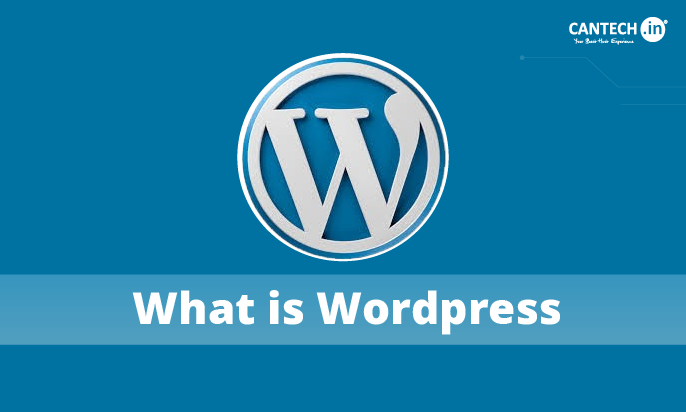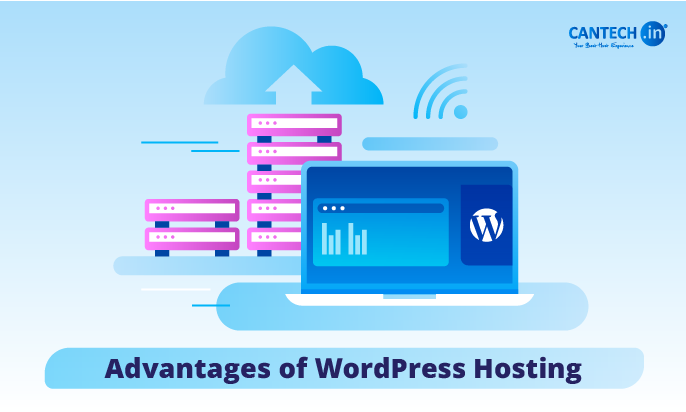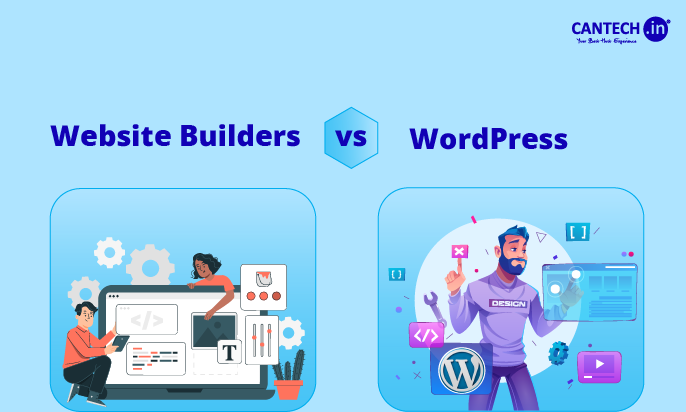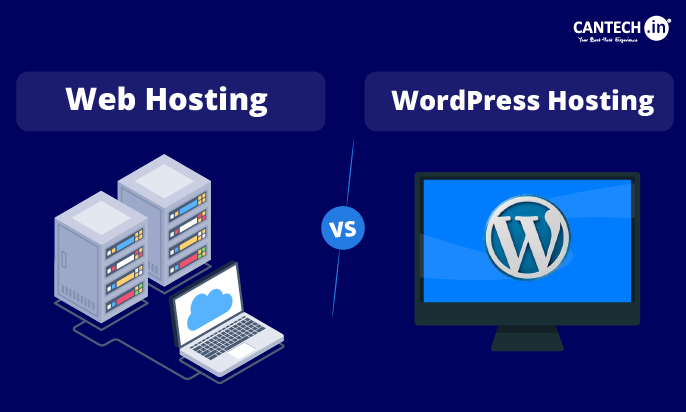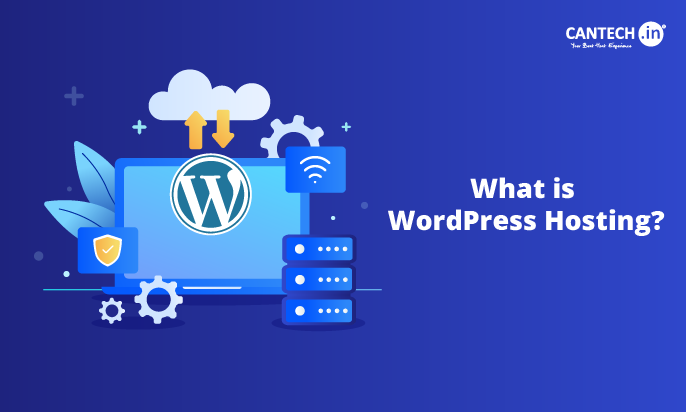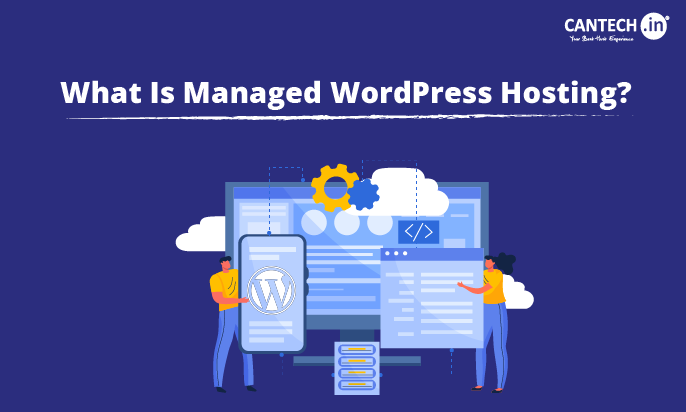Introduction
Welcome to our article on Drupal vs. WordPress, a comparison of two popular content management systems (CMS). Powerful and flexible are two words that describe Drupal. Whereas, WordPress is versatile and user-friendly. You need to choose the right CMS to build your desired website that meets your custom needs. Therefore, you must carefully study two widely used CMS options
Here, you will get to know these two CMS right from the basics to various points of comparison. Understand what these two have to offer and how they differ from each other.
Let us start with the basics i.e. Drupal vs. WordPress meaning.
What Is Drupal?
Drupal is free and open source. It provides great scalability and it supports complex enterprise-level projects. Moreover, it has a wide range of features and advanced customization options. Thus, developers can build highly customized and sophisticated websites.
All in all, its powerful tools and so many modules offer the developers advanced possibilities. It is user-friendly and has a CMS written in PHP. Well, Dries Buytaert created it in the year 2000.
What Is WordPress?
WordPress is also very popular. It is versatile but it is also a simple and user-friendly CMS.
It was mainly used for blogging and smaller websites. However, with the innovations and developments, it is also very much preferred for complex web development projects. WordPress dashboard needs minimal technical knowledge to easily create and manage the websites.
All in all, its simplicity and accessibility make it a popular choice for beginners and bloggers.
WordPress CMS is also free and open source. It has a wide range of plugins and themes for you to create functional and versatile sites.
Matt Mullenweg and Mike Little created it in 2003. Further, it is also written in PHP with a MySQL or MariaDB database.
Read More: What is WordPress?
Drupal Advantages
Now that we have discussed and compared various aspects of Drupal vs. WordPress, let us summarise the Drupal advantages first:
- Drupal is a highly preferred choice for complex and enterprise-level website building. It has powerful features that can help build complex customised sites with high-end content structures.
- Great scalability and extensive modules & plugins are distinguished benefits of Drupal.
- It is an open-source and Drupal installation is free.
- Drupal has extensive community support and it is highly active in addressing any issues or vulnerabilities.
- It includes security and SEO features to give a comprehensive experience.
WordPress Advantages
WordPress is a very popular CMS, let us review its advantages:
- You can download and install WordPress for free as it is an open-source CMS. Therefore, WordPress is one of the Drupal alternatives as an open-source CMS.
- WordPress has an easy and user-friendly interface so it is highly preferred by beginners. It does not need extensive technical knowledge.
- Started as a blogging platform, it evolved to be used in more versatile site development with advanced features, themes, and plugins. It also offers advanced plugins for SEO and implements security measures.
- The WordPress community is highly active and it also has official support through various means.
Read More: Advantages of WordPress Hosting
The Comparison of Drupal vs. WordPress CMS
Let’s look at the Drupal vs WordPress strengths and weaknesses in terms of below aspects –
Ease of Use and Beginner-Friendliness
Learning Curve
WordPress is very popular because of its intuitiveness and user-friendly dashboard interface. Thus, beginners prefer it over other options.
You can easily navigate and manage your websites without extensive technical knowledge.
Whereas, Drupal is powerful and more complex so it needs more time to learn. Its complex framework needs prior experience in website development. This is one of the disadvantages Of Drupal.
However, once you learn Drupal’s structure, you can highly benefit from its powerful features and flexibility.
User Interface
As discussed, WordPress UI is simple and easy with a clear structure. You can easily create, edit, and publish content using it.
Thousands of themes and visual customization options help in creating visually appealing websites without any deep coding knowledge.
On the other hand, Drupal offers a more advanced interface. However, it provides greater control and flexibility for experienced users with a modular approach.
You can customize and manage your websites easily with more precision.
Available Documentation
Drupal and WordPress have extensive resources and a vast community to contribute. You can easily use knowledgebase, tutorials, forums, etc. Therefore, users of any level can find help with any issues or questions.
There is one thing, documentation of Drupal CMS is more technical and comprehensive compared to WordPress.
Customization and Flexibility
These aspects are important to make your website stand out. So, let us know the customization options offered by Drupal and WordPress.
Themes, Plugins, and Modules
They both have a variety of themes, plugins, and modules. WordPress offers a wider variety of ready-made themes and plugins so it is considered highly user-friendly. You can quickly customize your websites without much technical knowledge.
On the other hand, Drupal is flexible and scalable. It has an extensive range of modules and themes to create highly customized websites for complex projects. It is considered highly versatile so it is preferred more by developers but needs more technical expertise.
Extensibility
Both have extensive options for enhancing the functionalities of your website. Drupal can handle complex enterprise-level websites. It can create custom content types and workflows. Moreover, it can define complex relationships between different content entities.
WordPress is a powerful CMS with numerous custom features to extend the website functionality. It has a huge WordPress plugin directory.
Therefore, while both Drupal and WordPress offer customization and flexibility, WordPress is user-friendly with ready-made themes and plugins. Whereas, Drupal meets complex requirements and offers a high level of customization.
Read More: website builder vs WordPress
Scalability and Performance
Handling Content and Traffic
Drupal is highly scalable and it handles extensive content and high traffic effortlessly. It is suitable for large-scale and enterprise-level websites.
On the other hand, WordPress has turned into a versatile CMS from a blogging platform. However, drawbacks of WordPress include that it may face some performance issues if there is a large amount of content or high traffic levels.
Caching and Performance Optimization
Both CMS offer caching options and performance optimization techniques.
| Scalability and Performance | Drupal | WordPress |
|---|---|---|
| Content-handling | It is suitable for extensive content as it is highly scalable. | Efficient for smaller websites and blogs. If the content amounts increase, it may face issues. |
| Traffic Levels | Drupal is efficient for high-traffic sites. | There may be issues in performance for heavy-traffic sites. |
| Caching options | Improves website speed with caching options available. | Gives improved performance with their caching options. |
| Performance optimization techniques | Its plugins and modules optimize performance | Its ready themes and plugins enhance performance. |
Drupal vs WordPress Security
Let us now understand one of the most essential aspects of any website – security features and practices.
Updates
Regular updates are essential for maintaining the security of a CMS. Thus, Drupal and WordPress both keep their platforms secure and up-to-date with the latest patches and fixes. With frequent updates, they address vulnerabilities.
However, Drupal has a more structured release cycle with scheduled updates. Therefore, the administrators can plan and stay proactive.
On the other hand, WordPress security is more flexible in releases and rolls them out as soon as available. So, you can have access to fixes quickly but may need to take care and prevent compatibility issues with themes and plugins.
Vulnerability Management
Drupal has a strong security team. It has a thorough security advisory following a proactive approach for detection and timely communication of any potential risks to the community.
Well, WordPress also has a dedicated security team. With a strong reporting process, vulnerabilities are detected beforehand and guidance is provided for mitigation.
Read More: Top 6 File Manager Plugins for WordPress
Drupal vs WordPress Speed
In terms of speed, Drupal generally performs faster due to its built-in performance features. On the other hand, WordPress can still achieve fast speeds with proper optimization through plugins and careful theme selection. However, it may need some work to achieve the same level as Drupal.
Community and Support
The Drupal community is very active. May it be forums, emails, or social media, the collective efforts of the team and the extensive community collaborate to address any issues or threats promptly. They take care of the security issues and provide resolutions for the same. Also, there are training, meetings and conferences.
With security best practices, code reviews, and initiatives, they ensure that Drupal remains a secure CMS.
Moreover, WordPress also has an amazing large community and a network of developers with forums and extensive resources. The community frequently responds to any concerns and vulnerabilities.
They are also very inclusive with a lot of members contributing to forums, meetings, etc.
Extensive documentation, tutorials, and guides are available for both Drupal and WordPress CMS.
With regard to official support, WordPress offers a dedicated support team that provides assistance through forums, documentation, and email. Whereas, Drupal doesn’t offer official support but does have an active community and vast knowledge base.
Drupal vs WordPress SEO
This aspect is about the built-in SEO capabilities of Drupal and WordPress with regard to its various features. They contribute to website visibility and SEO rankings.
- URL Structure: Drupal provides a powerful feature for creating search SEO-friendly URLs with relevant keywords. Well, WordPress also offers customizable URL structures to optimize them for improved SEO.
- Meta Tags: Drupal gives full control over meta tags and descriptions. Thus, you can easily optimize your pages for specific keywords and create compelling snippets. Whereas, WordPress offers various SEO plugins that have a user-friendly interface and make it simple to optimize your meta tags, titles and descriptions for your pages and posts.
- XML Sitemaps: With a built-in XML sitemap generation module, Drupal automatically creates sitemaps of your website’s content. WordPress doesn’t have a native XML sitemap generation feature but various plugins can generate the same.
- Other SEO Features: Both Drupal and WordPress have plugins that can optimize headings, images, and other on-page elements.
Read More: Web Hosting vs WordPress Hosting
WordPress Vs Drupal Costs and Licensing
WordPress hosting has lower licensing fees but Drupal can be more cost-effective for larger websites with complex requirements. Let us review how –
Licensing Fees
Why is WordPress so popular? Well, one of the reasons is that it is an open-source CMS. Therefore, it is free to download and use.
On the other hand, Drupal is also open-source. However, it is more powerful and advanced so it is more preferred for enterprise-level projects.
Premium Themes and Plugins
Do you want a more specialised site?
If yes, premium themes and plugins can help you with that. They are available at affordable prices with WordPress. Well, they have licensing fees and are chargeable.
However, there are so many free WordPress themes and plugins available too.
If we compare, Drupal has a smaller collection of premium themes and modules; but it is growing gradually. They need you to incur a higher upfront investment. Thus, additional licensing for specialized modules or support may arise.
Overall, they offer more robust features and support as per your business needs.
Hosting Expenses
Drupal and WordPress help build the site but they need hosting services too. They can be hosted on various platforms on different web hosting types. The cost of hosting differs based on various factors like the website traffic, hosting provider, the plan you choose, etc. Moreover, Drupal managed and WordPress managed hosting services has more cost due to additional features and solutions.
Conclusion
This comparison of Drupal vs. WordPress makes it clear that both these content management systems have their specific features. However, they are also the same in some aspects.
So, what would you choose? Well, Drupal or WordPress choice depends on your website needs and preferences. You can get Drupal if you want a highly customizable and scalable CMS for a complex website. However, an intuitive and beginner-friendly CMS is WordPress and it has so many plugins and templates.
Moreover, Drupal can handle complex projects as it has advanced customization options. Also, it has advanced security features and frequent updates that protect the websites and user data.
On the other hand, WordPress has a user-friendly interface and so many plugins & themes. These aspects make it ideal for beginners and let you quickly set up a website or blog. However, WordPress does not have the same level of flexibility and scalability as Drupal but it is simple and easy to use.
Moreover, In general, WordPress hosting has more budget-friendly options available but Drupal hosting can be more expensive due to its scalability and resource-intensive application.
All in all, Drupal and WordPress are powerful CMS platforms that can help you create and manage a successful website.
FAQs
Is WordPress More Popular Than Drupal?
WordPress and Drupal both are popular but they both differ in terms of use cases in which they are preferred more. In other words, WordPress is simple so it is more used for beginner-friendly blogs or websites. It also has the capability to build more customised and high-level sites.
On the other hand, Drupal is powerful and scalable. You can install Drupal also for free. It is one of the WordPress alternatives as an open -source CMS. However, it has a complex interface but also it offers more advanced features for customisation. Themes and plugins with both CMS help customize and add advanced functionality to the website. Therefore, it is popular for creating enterprise-level websites for heavy traffic handling.
Can I Migrate From Drupal to WordPress?
Yes, you can. The migration process includes the transfer of files and functionalities with the help of advanced tools and professional services.
Why Should I Migrate From WordPress To Drupal?
In general, Drupal is more powerful and advanced due to its high customisation and flexibility. It is highly used to create more complex and high-traffic sites that require extensive resources and optimal performance. Well, it is highly scalable too.
What Is the Main Difference Between WordPress and Drupal?
The primary difference is in ease of use and thereby both their applications.
WordPress is beginner-friendly whereas Drupal is more complex to understand for beginners. Therefore, WordPress is more used for small blogs or sites and Drupal helps developers build complex and high-traffic websites.



